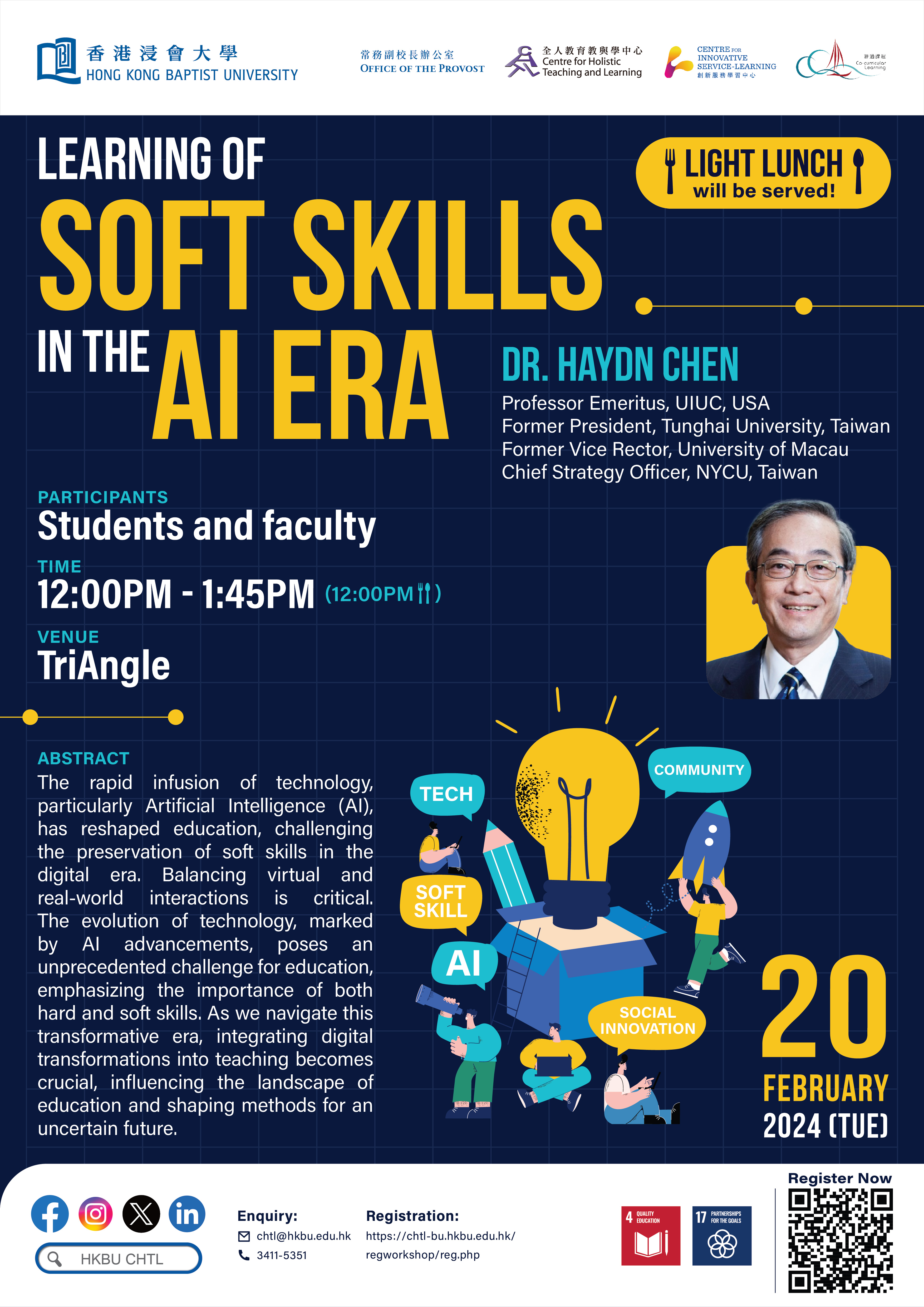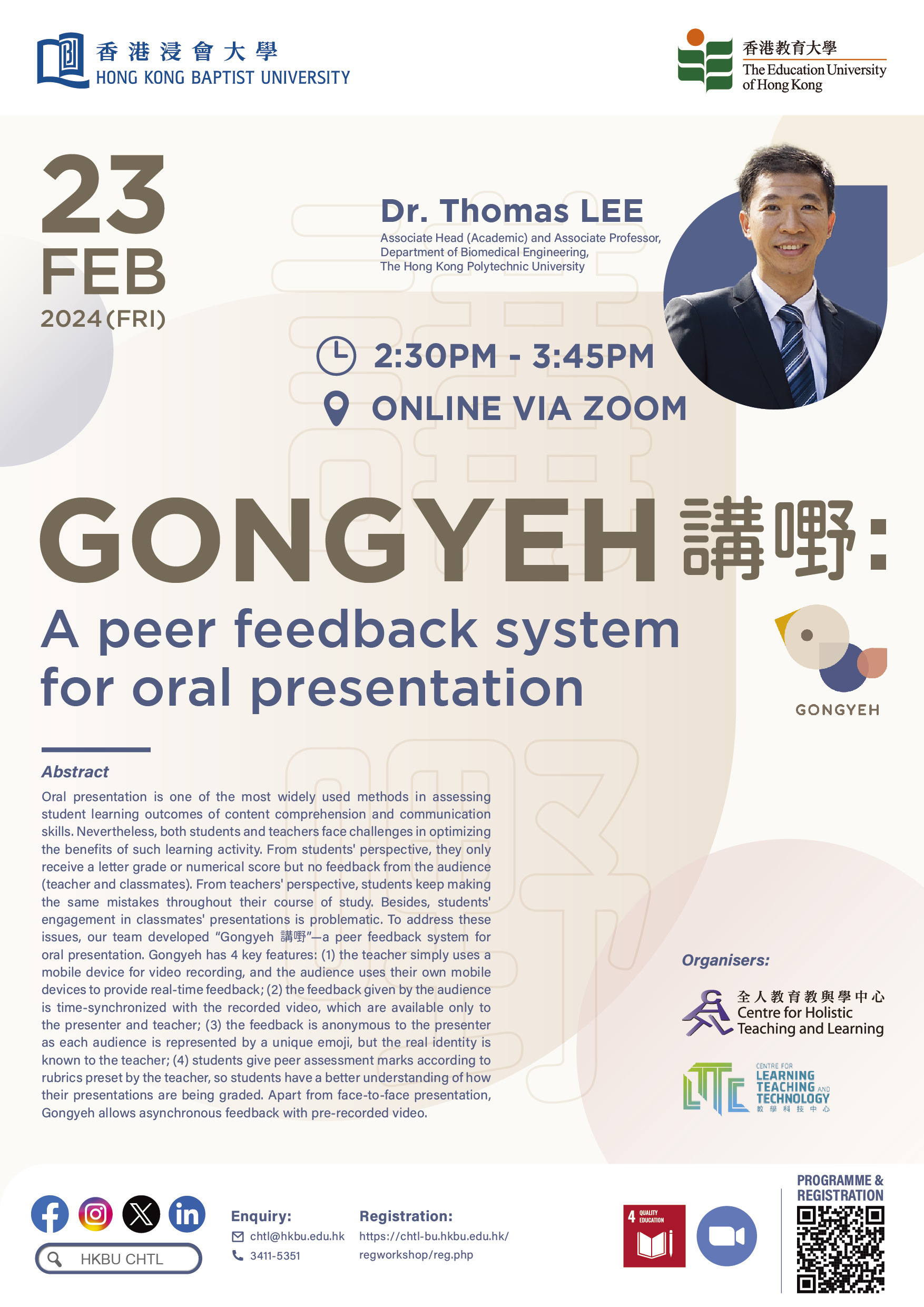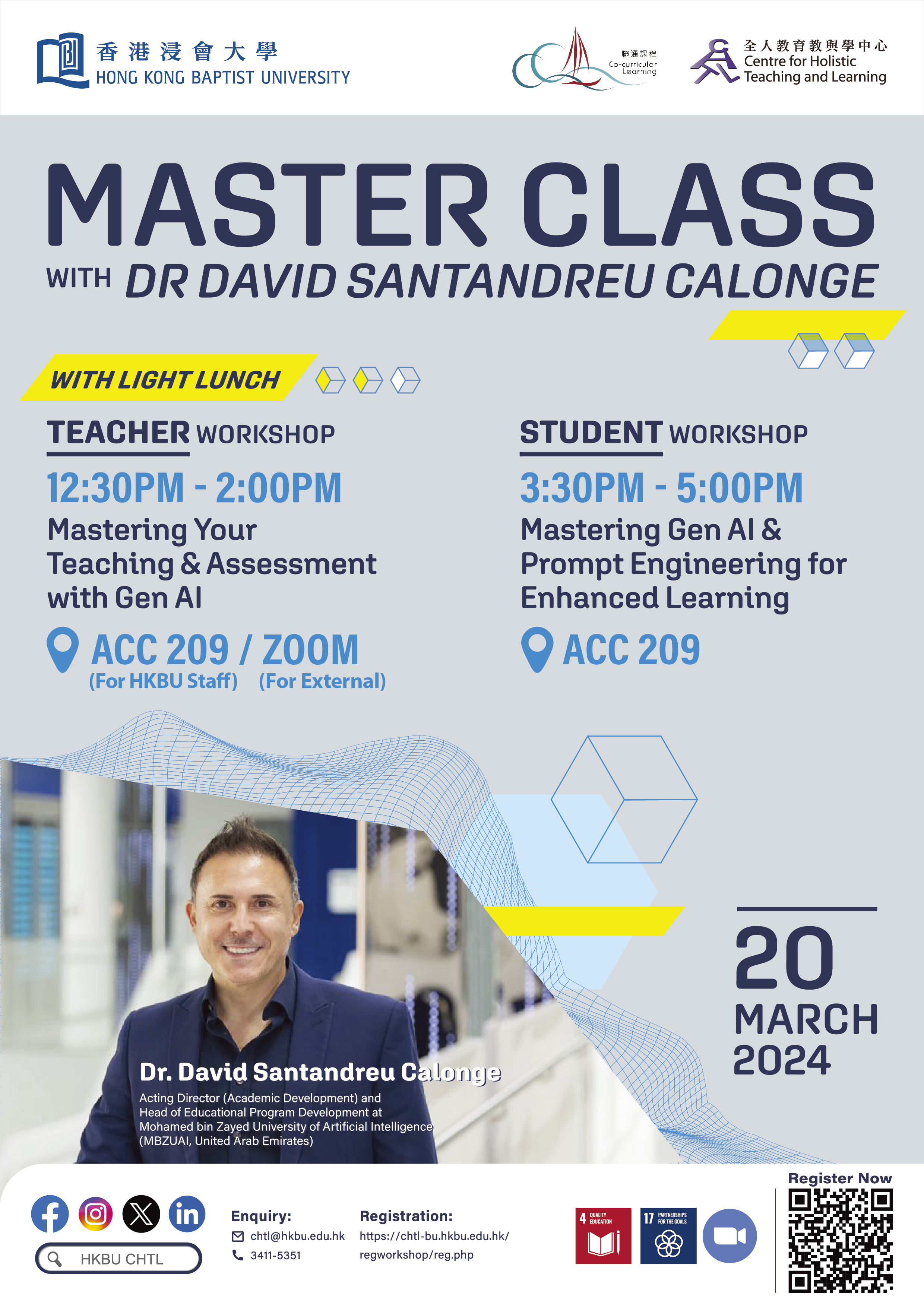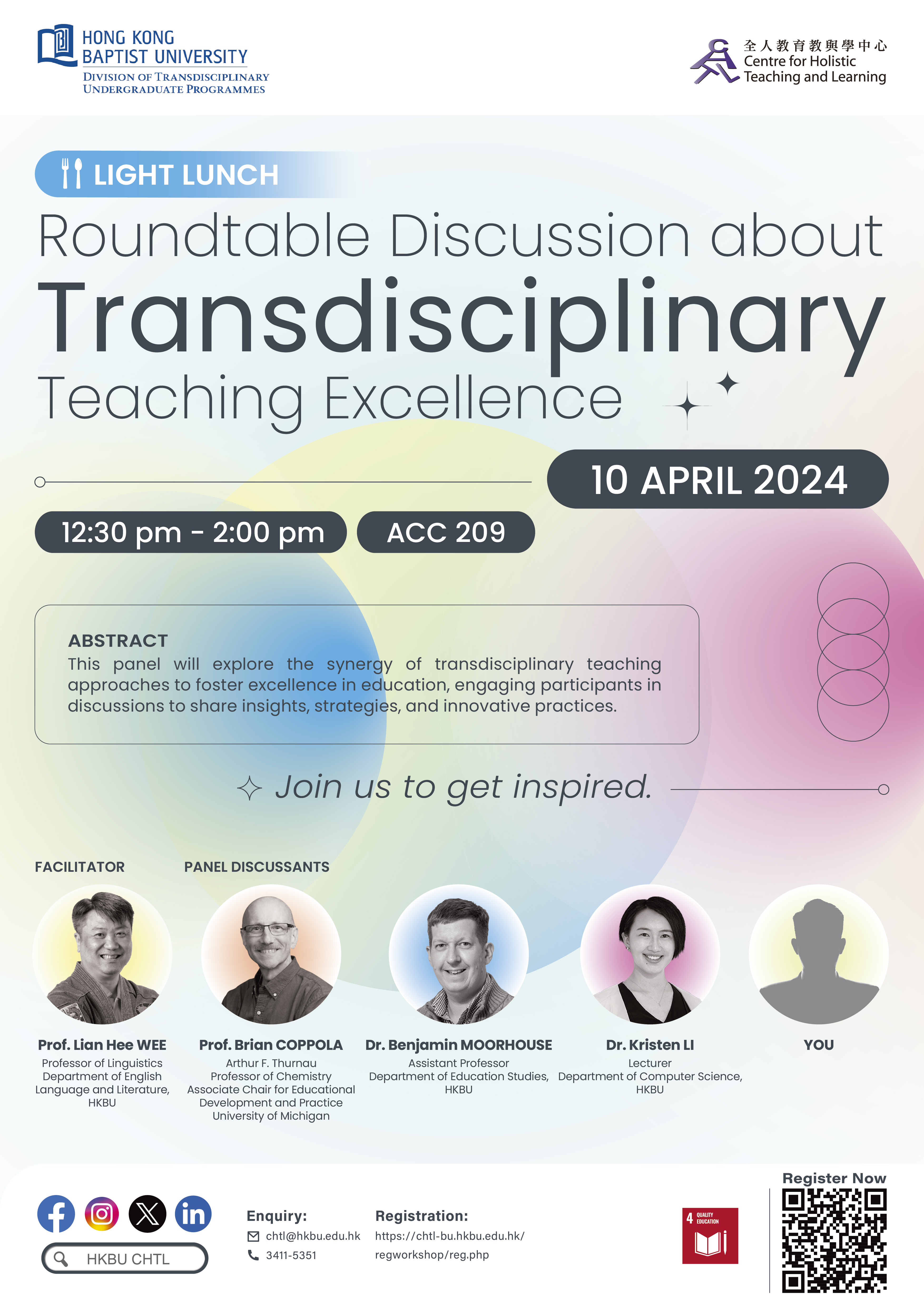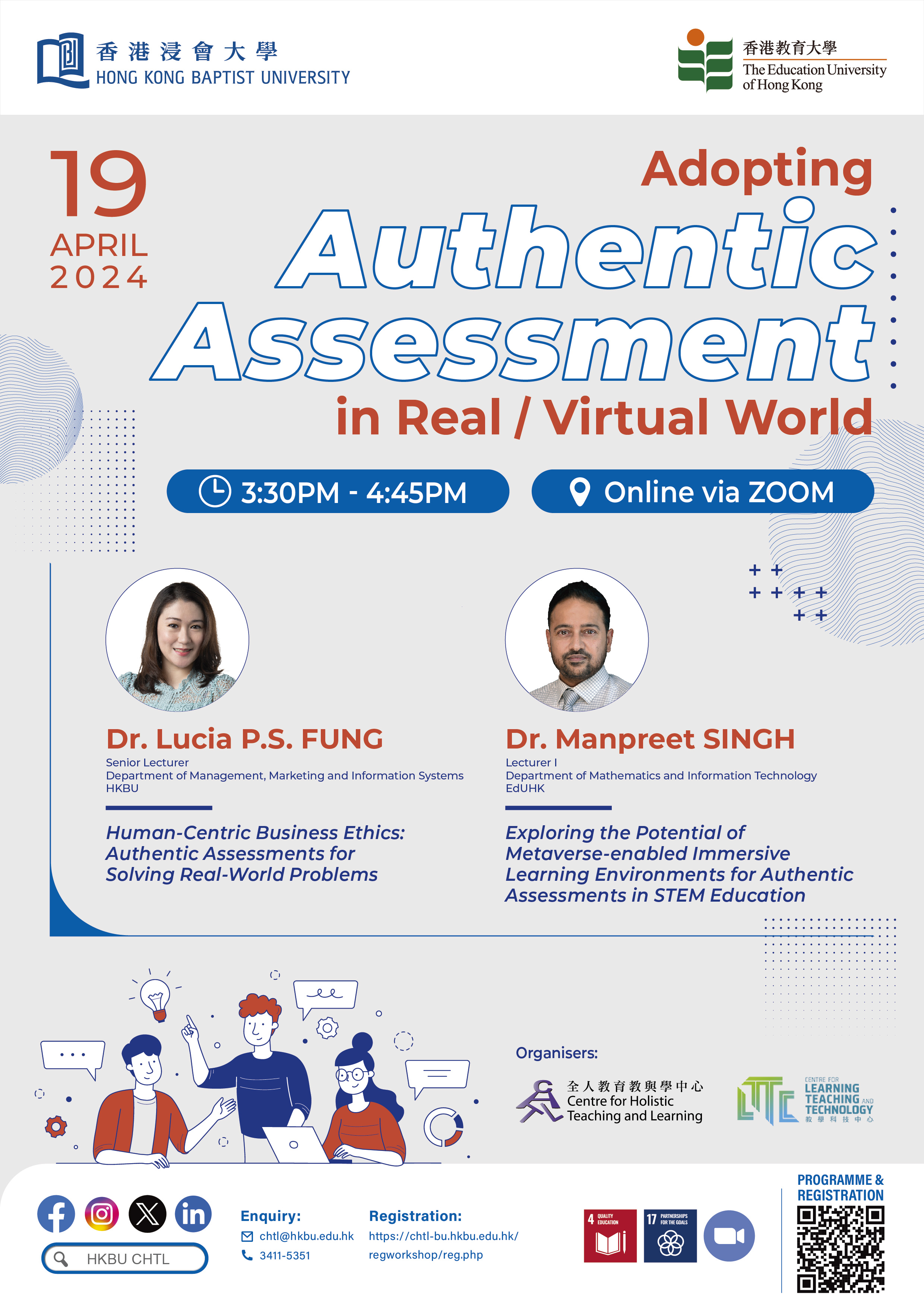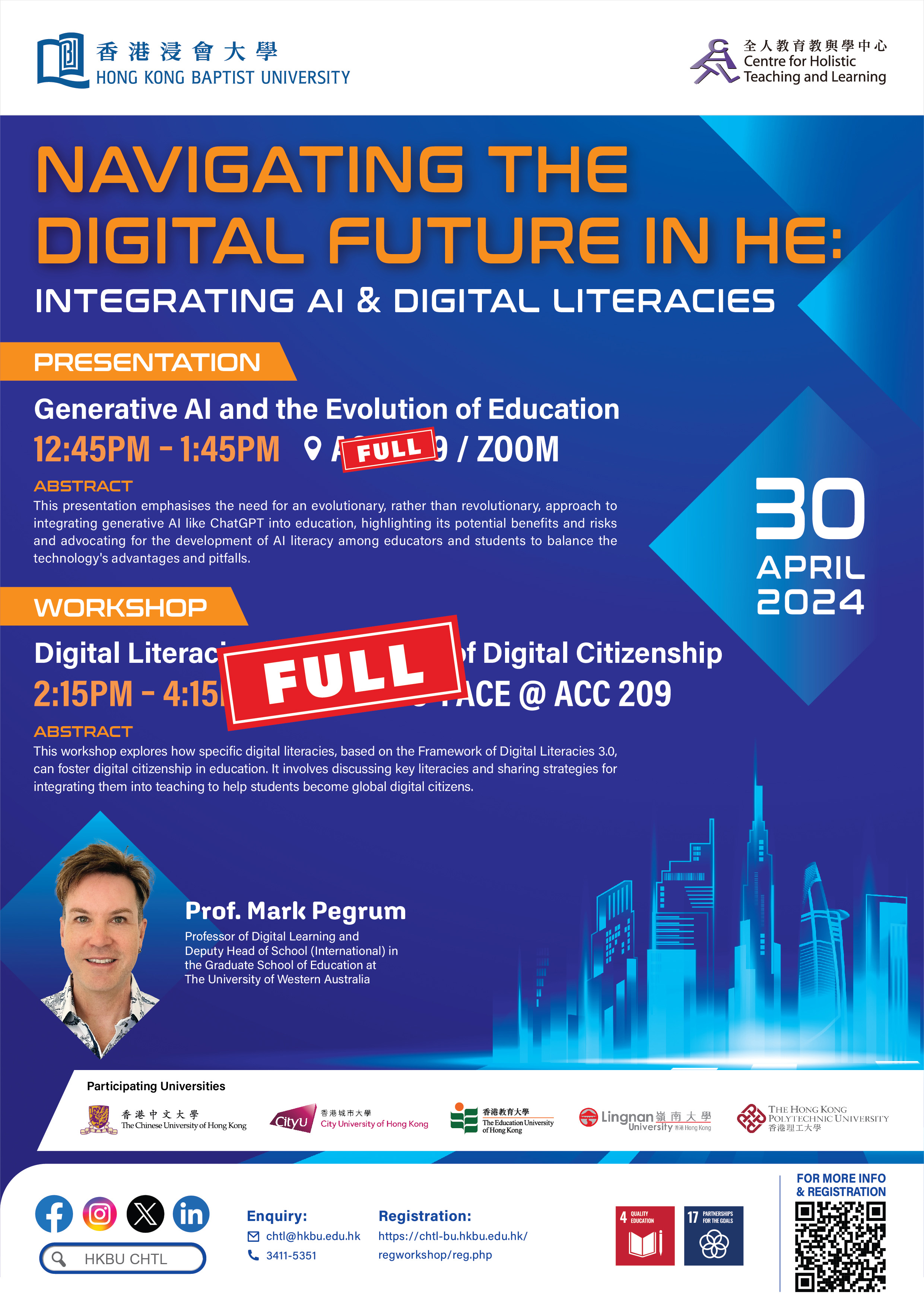Teaching and Learning Experience Sharing (TALES) Seminar Series (2023/24 Semester 2)
Intended Learning Outcomes
At the end of TALES, participants will be able to:
- Describe the HKBU Graduate Attributes and their importance in the OBTL implementation;
- Develop constructively aligned Intended Learning Outcomes (ILOs), Teaching and Learning Activities (TLAs) and Assessment Methods (AMs) for their respective courses;
- Experiment with new and innovative teaching activities through the deployment of eLearning.
Outline
Workshop Details
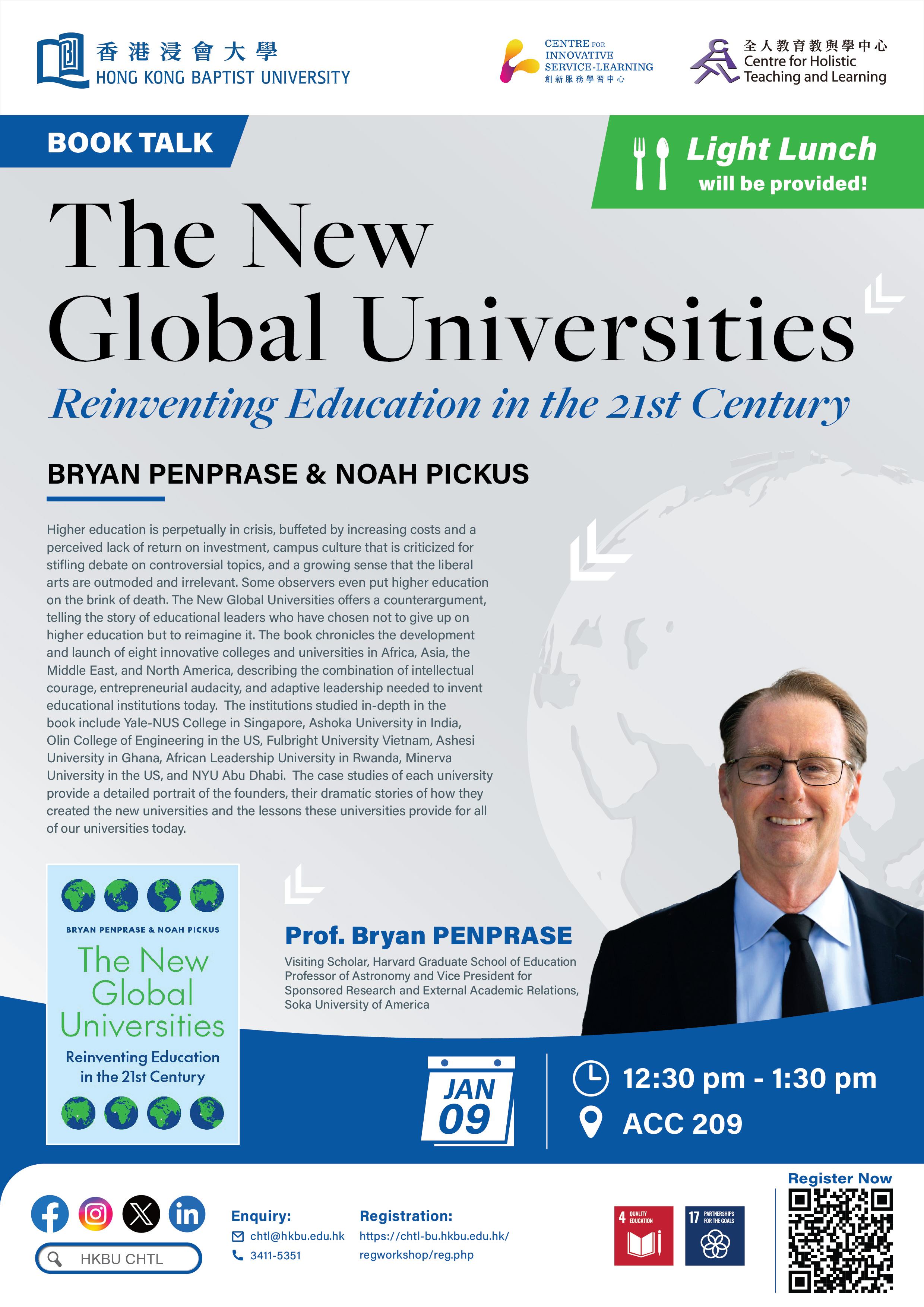

Facilitator(s):
Professor Bryan PENPRASE (Visiting Scholar, Harvard Graduate School of Education Professor of Astronomy and Vice President for Sponsored Research and External Academic Relations, Soka University of America)
Prof. Bryan PENPRASE is currently a visiting scholar at Harvard University, researching the future of higher education and innovation within universities and colleges. Bryan serves as Vice President for External Academic Relations and Sponsored Research at Soka University of America. He is the author of four books, including two recently published books, The New Global Universities – Reinventing Higher Education for the 21st Century, with co-author Noah Pickus, published by Princeton University Press and Models of Time and Space - the Foundations of Astrophysical Reality from Across the Centuries, published by Springer, Inc. He is also the author of STEM Education for the 21st Century, and The Power of Stars – How Celestial Observations Have Shaped Civilization, both published by Springer, Inc. Bryan was a founding faculty member of the Yale-NUS College in Singapore, a former ACE fellow at Yale University, and also taught for 20 years at Pomona College.
Abstract:
The New Global Universities: Reinventing Education in the 21st Century
Bryan Penprase & Noah Pickus
Reimagining higher education around the world: lessons from the creation of eight new colleges and universities in Africa, Asia, the Middle East, and North America
Higher education is perpetually in crisis, buffeted by increasing costs and a perceived lack of return on investment, campus culture that is criticized for stifling debate on controversial topics, and a growing sense that the liberal arts are outmoded and irrelevant. Some observers even put higher education on the brink of death. The New Global Universities offers a counterargument, telling the story of educational leaders who have chosen not to give up on higher education but to reimagine it. The book chronicles the development and launch of eight innovative colleges and universities in Africa, Asia, the Middle East, and North America, describing the combination of intellectual courage, entrepreneurial audacity, and adaptive leadership needed to invent educational institutions today. Bryan Penprase and Noah Pickus show how the founders of new colleges and universities establish distinctive brands in a sector dominated by centuries-old institutions, secure creative sources of funding, attract stellar faculty and students, and design appealing curriculums and campuses—all while managing tradeoffs and setbacks, balancing local needs and global aspirations, and wrestling with challenges to academic freedom. Their experiences offer lessons for future founders of new universities—and for those who want to renew and rejuvenate existing ones.
Sustainable Development Goals (SDG) Mapping
TALES 2 – Advancing Authentic Assessment: Multimodal Intervention Systems and Podcasting in Higher Education
[Jointly Organised by Centre for Holistic Teaching and Learning (CHTL), HKBU & Centre for Learning, Teaching and Technology (LTTC), EdUHK]
Date & Time:
16 January 2024 (Tuesday), 2:30 pm - 3:45 pm
Venue:
Online via Zoom
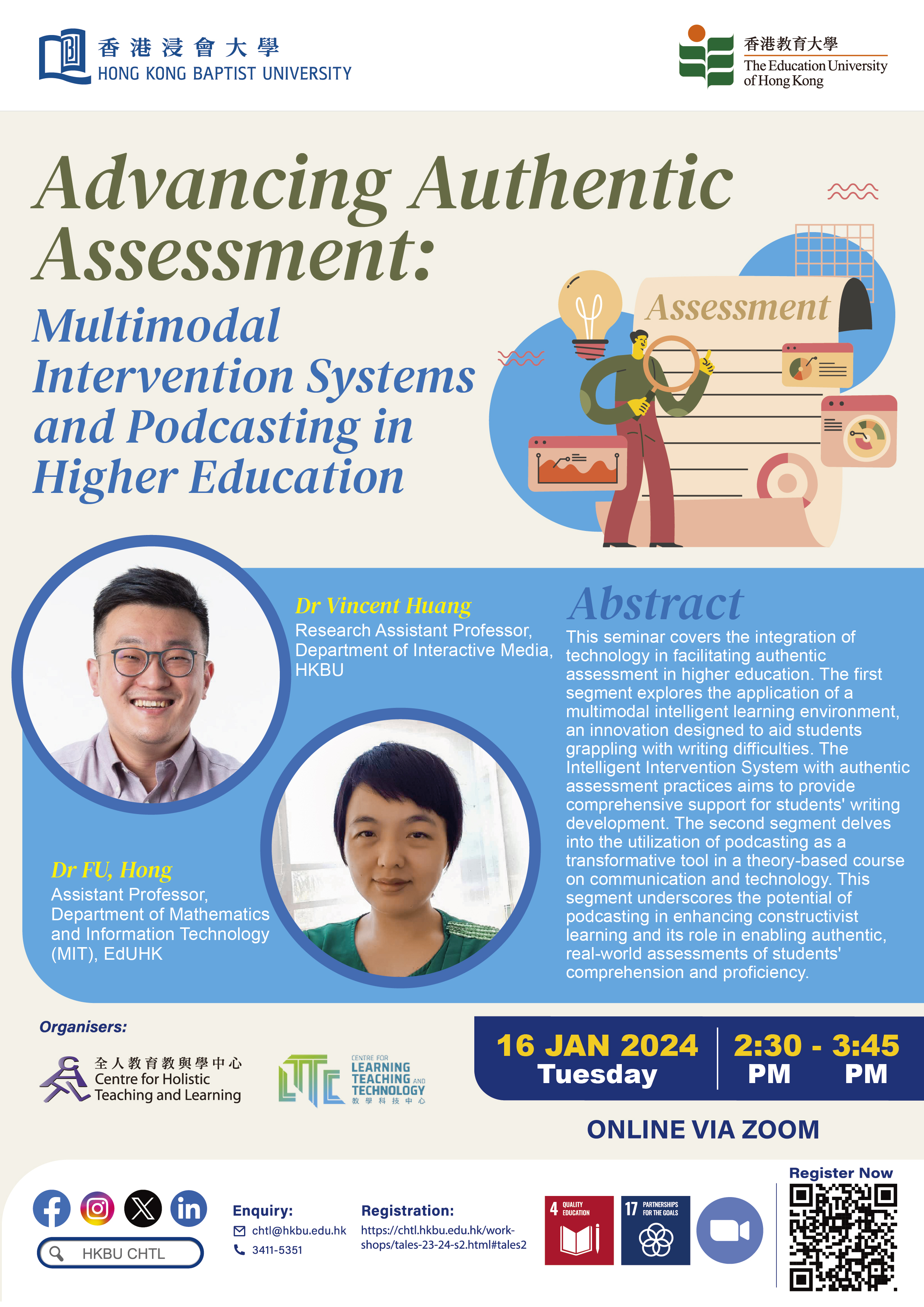

Facilitator(s):
Dr Vincent HUANG (Research Assistant Professor, Department of Interactive Media (IMD), HKBU)
Dr Hong FU (Assistant Professor, Department of Mathematics and Information Technology (MIT), EdUHK)
Abstract:
This seminar covers the integration of technology in facilitating authentic assessment in higher education. The first segment explores the application of a multimodal intelligent learning environment, an innovation designed to aid students grappling with writing difficulties. The Intelligent Intervention System with authentic assessment practices aims to provide comprehensive support for students' writing development. The second segment delves into the utilization of podcasting as a transformative tool in a theory-based course on communication and technology. This segment underscores the potential of podcasting in enhancing constructivist learning and its role in enabling authentic, real-world assessments of students' comprehension and proficiency.
Dr Vincent HUANG
Research Assistant Professor, Department of Interactive Media (IMD), HKBU
Title: Studying Real-Life Issues with a Voice: Student Creative Podcasting in a Theory Course
This presentation will share an academic-industry collaboration on creative podcasting as a major assignment for a theory-based course on communication and technology. It will provide a suggested workflow to achieve authentic assessment and learning, based on the presenter's three-year experience in instructing podcast production both inside and outside the classroom. It will also highlight the transformational potential of podcasting in traditional lectures, its role in enhancing constructivist learning, and its positive impact on the relationship between learners and teachers.
Dr Hong FU
Assistant Professor, Department of Mathematics and Information Technology (MIT), EdUHK
Title: An Approach for Multimodal Information Fusion in Addressing College Students' Writing Difficulties: Towards an Intelligent Intervention System
The utilization of learning environments that employ multimodal information processing techniques has proven effective in facilitating intelligent learning. Extensive research has revealed a close association between college students' writing quality, personality, and academic performance. However, the glaring lack of effective intervention methods for college students with writing difficulties necessitates further exploration to improve this critical element of academic development. This project aims to establish a new multimodal intelligent learning environment that facilitates intervention training for college students facing writing difficulties by leveraging advanced computer vision technology. The proposed system will not only focus on recognizing and integrating multimodal signals such as body posture, attention, and pen pressure but also incorporate authentic assessment methods to assess students' performance. These assessment methods may include case studies, student self-assessment, and peer assessment. Through the creation of specialized interventions tailored specifically for students confronted with writing difficulties, writing activities will be adjusted to accommodate individual learners' behavior, cognition, and psychological states, thereby addressing their unique needs and adopting a learner-centered approach. By creating a rational intelligent adjustment model and establishing an effective intervention mechanism, this project will introduce a new multimodal intelligent learning approach for college students struggling with writing difficulties. The successful implementation of this project has significant implications for interdisciplinary research in cognitive science, computer science, and artificial intelligence, as it seeks to blend multimodal information fusion with authentic assessment practices to provide comprehensive support for students' writing development.
Sustainable Development Goals (SDG) Mapping
![Tell Your AI TALES in Learning and Teaching [CCL Recognised] Tell Your AI TALES in Learning and Teaching [CCL Recognised]](/content/dam/chtl-assets/workshops/ay2324s2/tales-poster-20240124.jpg)
![Tell Your AI TALES in Learning and Teaching [CCL Recognised] Tell Your AI TALES in Learning and Teaching [CCL Recognised]](/content/dam/chtl-assets/workshops/ay2324s2/tales-poster-20240124.jpg)
Facilitator(s):
Dr Benjamin MOORHOUSE (EDUC)
Abstract:
A casual gathering for students and teachers to share their Al learning and teaching stories.
Sustainable Development Goals (SDG) Mapping
TALES 4 – Learning of Soft Skills in the AI Era [CCL Recognised]
[Jointly Organised by the Office of the Provost, Centre for Holistic Teaching and Learning (CHTL) & Centre for Innovative Service-Learning (CISL)]
Date & Time:
20 February 2024 (Tuesday), 12:00 pm - 1:45 pm
(Light Lunch will be served)
Venue:
TriAngle (DLB306, David C Lam Building, Shaw Campus)
Facilitator(s):
Dr Haydn CHEN
Professor Emeritus, UIUC, USA
Former President, Tunghai University, Taiwan
Former Vice Rector, University of Macau
Chief Strategy Officer, NYCU, Taiwan
Being one of the very few who have had higher education experience in seven universities on both sides of the Pacific Ocean, Dr Haydn Chen has a unique combination of experiences that would be a resource to many. With MS and PhD degrees in materials science from Northwestern University, he began his academic career at the University of Illinois at Urbana-Champaign, where he is now an Emeritus Professor.
Full biography: https://matse.illinois.edu/people/profile/haydnc
Abstract:
The rapid infusion of technology, particularly Artificial Intelligence (AI), has reshaped education, challenging the preservation of soft skills in the digital era. Balancing virtual and real-world interactions is critical. The evolution of technology, marked by AI advancements, poses an unprecedented challenge for education, emphasizing the importance of both hard and soft skills. As we navigate this transformative era, integrating digital transformations into teaching becomes crucial, influencing the landscape of education and shaping methods for an uncertain future (Related under-working article).
Sustainable Development Goals (SDG) Mapping
Facilitator(s):
Dr Thomas LEE
Associate Head (Academic) and Associate Professor, Department of Biomedical Engineering, The Hong Kong Polytechnic University
Abstract:
Oral presentation is one of the most widely used methods in assessing student learning outcomes of content comprehension and communication skills. Nevertheless, both students and teachers face challenges in optimizing the benefits of such learning activity. From students' perspective, they only receive a letter grade or numerical score but no feedback from the audience (teacher and classmates). From teachers' perspective, students keep making the same mistakes throughout their course of study. Besides, students' engagement in classmates' presentations is problematic. To address these issues, our team developed “Gongyeh 講嘢”—a peer feedback system for oral presentation. Gongyeh has 4 key features: (1) the teacher simply uses a mobile device for video recording, and the audience uses their own mobile devices to provide real-time feedback; (2) the feedback given by the audience is time-synchronized with the recorded video, which are available only to the presenter and teacher; (3) the feedback is anonymous to the presenter as each audience is represented by a unique emoji, but the real identity is known to the teacher; (4) students give peer assessment marks according to rubrics preset by the teacher, so students have a better understanding of how their presentations are being graded. Apart from face-to-face presentation, Gongyeh allows asynchronous feedback with pre-recorded video.
Sustainable Development Goals (SDG) Mapping
TALES 6 – Master Class with Dr David Santandreu Calonge [CCL Recognised]
Date:
20 March 2024 (Wednesday)
Teacher Workshop: Mastering Your Teaching & Assessment with Gen AI
Time:
12:30 pm – 2:00 pm (Light Lunch will be served)
Venue:
ACC209 (For HKBU Staff)/ Online via Zoom (For External)
Student Workshop: Mastering Gen AI & Prompt Engineering for Enhanced Learning [CCL Recognised]
Time:
3:30 pm – 5:00 pm (Light Refreshment will be served)
Venue:
ACC209
Facilitator(s):
Dr David Santandreu Calonge
Acting Director (Academic Development) and Head of Educational Program Development at Mohamed bin Zayed University of Artificial Intelligence (MBZUAI, United Arab Emirates)
He is an award-winning academic and has previously worked in Hong Kong, South Korea, Australia, and Dubai and has written in the areas of education policy, Generative AI in Learning and Teaching, MOOCs, innovative curriculum design, and disruptive technologies in education.
Abstract:
Conducted by Dr David Santandreu Calonge, the two workshops aim to provide insight for teachers and students in teaching and learning through utilising AI tools. In the morning session, the participants will be introduced to various creative uses of ChatGPT and other AI tools in education. In the afternoon session, the workshop demonstrates how students can acquire the best learning outcome with inspirational tips of engineering AI prompts.
Sustainable Development Goals (SDG) Mapping
Facilitator(s):
Professor Lian Hee WEE
Professor of Linguistics, Department of English Language and Literature, HKBU
Panel Discussant(s):
Professor Brian P. COPPOLA
Arthur F. Thurnau Professor of Chemistry, Associate Chair for Educational Development and Practice University of Michigan
Dr Benjamin MOORHOUSE
Assistant Professor, Department of Education Studies, HKBU
Dr Kristen LI
Lecturer, Department of Computer Science, HKBU
Abstract:
This panel will explore the synergy of transdisciplinary teaching approaches to foster excellence in education, engaging participants in discussions to share insights, strategies, and innovative practices.
Sustainable Development Goals (SDG) Mapping
Facilitator(s):
Dr Lucia P.S. FUNG
Senior Lecturer, Department of Management, Marketing and Information Systems, HKBU
Dr Manpreet SINGH
Lecturer I, Department of Mathematics and Information Technology, EdUHK
Abstract:
Human-Centric Business Ethics: Authentic Assessments for Solving Real-World Problems (Dr Lucia P.S. FUNG)
This presentation delves into the design of authentic assessments in business ethics education that calls for students to confront real-world ethical problems, encouraging the development of practical strategies that are informed by an awareness of human behaviors and considerations relevant to decision makers in business contexts.
The core of these assessments lies in tasks that simulate genuine ethical dilemmas, wherein students must navigate the intricacies of psychological impacts on human behavior and decision-making in actual practice. Additionally, students are expected to formulate action plans that anticipate the practical concerns of a business's leadership team, ensuring that strategies are actionable and sensitive to organizational realities.
Such authentic assessments serve a dual purpose: they provide students with the crucial skills needed to bridge the gap between theory and business practice, and they instill a robust, human-centric approach to problem-solving. The speaker will discuss her experiences and challenges on crafting assessments that prepare students to address the ethical challenges of the business world in a manner that is both morally sound and practically viable.
Exploring the Potential of Metaverse-enabled Immersive Learning Environments for Authentic Assessments in STEM Education (Dr Manpreet SINGH)
Step into the future of education with this talk on the transformative potential of metaverse-enabled immersive learning environments (MeILE) in revolutionizing assessments for STEM education. This captivating presentation highlights the benefits of immersive, gamified, and authentic assessments, providing students with engaging and self-directed learning experiences. Through interactive simulations and the integration of gamification elements, students are motivated to participate actively in the assessment process. Dr Singh will discuss how these immersive learning environments bridge the gap between theory and practice, nurturing critical thinking and problem-solving skills. Discover how metaverse technologies reshape assessments, offering immersive and authentic learning experiences that foster experiential learning. Join us in exploring this promising future of dynamic assessments in STEM education.
Sustainable Development Goals (SDG) Mapping
TALES 9 – Navigating the Digital Future in HE: Integrating AI & Digital Literacies
[Participating Universities: CUHK, CityU, EdUHK, LU and PolyU]
Date:
30 April 2024 (Tuesday)
Presentation: Generative AI and the Evolution of Education
Time:
12:45 pm – 1:45 pm (Light Lunch will be served)
Venue:
ACC209 (FULL) and online via Zoom
Workshop: Digital Literacies in the Service of Digital Citizenship
Time:
2:15 pm – 4:15 pm
Venue:
ACC209 (FULL)
Facilitator(s):
Professor Mark PEGRUM
Professor of Digital Learning and Deputy Head of School (International) in the Graduate School of Education at The University of Western Australia
Professor Mark Pegrum lectures on digital learning in the Graduate School of Education at The University of Western Australia in Perth, where he is also the Deputy Head of School (International). His current research focuses on mobile and emerging technologies, including extended reality (XR) and generative artificial intelligence (AI); digital literacies, including attentional literacy and AI literacy; and the forms digital learning takes in diverse contexts across the Global North and South. His books include: Mobile Learning: Languages, Literacies and Cultures (2014); Mobile Lenses on Learning: Languages and Literacies on the Move (2019); and Digital Literacies (2nd ed.; co-authored with Nicky Hockly & Gavin Dudeney, 2022). Further details can be found on his website at https://markpegrum.com/about-mark-pegrum/biodata/.
Abstract:
Presentation - Generative AI and the Evolution of Education
Recent history is littered with unfulfilled promises that emerging technologies – from television to computers, and from the internet through web 2.0 to extended reality (XR) – would completely transform teaching and learning. Now the same promises are being made of generative AI. This presentation argues that we should not be focusing on educational revolution, but instead on educational evolution. Education is a complex social, cultural and political endeavour, with multiple stakeholders including students, teachers, parents, employers and governments, and technology is just one of many elements in this ecology.
Leaving behind the distractions of revolutionary rhetoric, this presentation will focus on what has actually changed technologically, and what could and should change educationally. In this way, we will discuss the impact of generative AI on the evolution of educational principles and practices.
It will be shown that ChatGPT and a range of other generative AI tools can contribute to teaching and learning in a number of ways, but we must be wary of their pedagogical, social and environmental risks. The presentation will recommend that we as educators should develop the AI literacy necessary to take a more nuanced view of generative AI, and that we should help our students to do the same. Ultimately, we must seek ways to balance the benefits of all educational technologies, including AI, against their pitfalls, in order to support the steady evolution of educational principles and practices to meet our students’ current and future needs.
Workshop - Digital Literacies in the Service of Digital Citizenship
The technological, informational and sociopolitical developments of the last decade have led to a changed landscape for teaching and learning. New educational possibilities have opened up, but new demands are also being made of education. As educators, we are called upon to help our students develop as digital citizens, who are familiar with the safe, savvy and social principles derived from the work of Mike Ribble and now embedded in the TDLEG IICA Project (Digital Citizenship).
This workshop will examine how the development of digital citizenship can be supported by the development of specific digital literacies, drawn from the Framework of Digital Literacies 3.0 by Mark Pegrum, Nicky Hockly and Gavin Dudeney. Following a poll to determine participants’ interests in particular digital literacies, a number of key literacies will be discussed, along with their role in supporting digital citizenship. Participants will be invited to share ideas on how to introduce these literacies into our teaching, and thereby help our students develop into global digital citizens.
